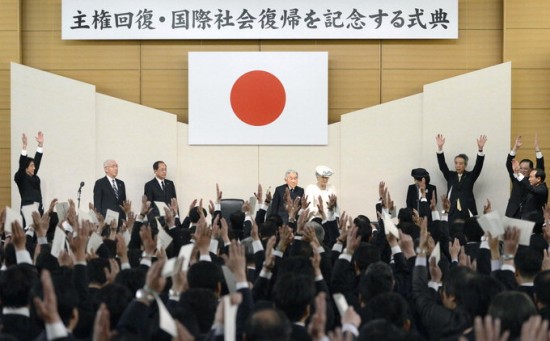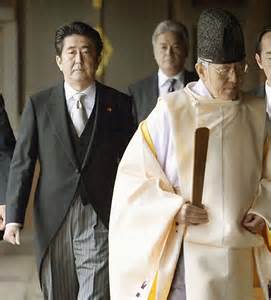
Prime minister Abe, at the left of the picture, raises his arms while shouting Tenno heika banzai (courtesy Japan Daily Press)
A commentary in today’s Japan Times by Takamitsu Sawa highlights how once more, as in pre-war times, Shinto is being exploited by nationalist forces in Japan keen to strengthen the country’s military. As with State Shinto, the neo-nationalism is underpinned by an ideology of a divinely blessed emperor-centred nation. It’s an ideology with roots in Yamato times when it was first committed to print in Kojiki (712) and Nihon shoki (720).
Prime minister Abe has sought to use the garb of Shinto to further his nationalist agenda. Despite fierce opposition, he insisted on the highly symbolic visit to Yasukuni Shrine. He attended the shikinen sengu ceremony at Ise with his full cabinet (the first time since 1929), thereby promoting ties of state and Shinto which had been cut by GHQ in 1945. And in a provocative act, he raised his arms to shout out ‘Tenno heika banzai’ in the manner of WW2 soldiers, an act rarely seen by elected officials since the war.
There are those amongst Western sympathisers with Shinto who support Abe in all this. They are usually right-wing themselves, and make the argument that Yasukuni is a purely religious issue. It makes them complicit in a political agenda which seeks step-by-step to absolve Japan of guilt for WW2. These fellow-travellers should examine their consciences, for unless Abe is opposed by gaiatsu (foreign pressure) worse will surely follow. The lessons of the 1930s need to be taken to heart.
Kudos to Takamitsu Sawa, president of Shiga University, for daring to speak out.
************************************************************
Yamatoism is coming back
BY TAKAMITSU SAWA MAR 25, 2014 Japan Times
Shortly after the start of the second half of 1985, there came a burst of criticism from European and American intellectuals against “Yamatoism,” the word “Yamato” being Japan’s ancient name.
What touched them off was a thesis written by Dutch journalist Karel van Wolferen, which appeared in the winter 1986-87 issue of Foreign Affairs, a prestigious magazine published by the Council on Foreign Relations.

Prime minister Abe on his controversial visit to Yasukuni (courtesy Japan Times)
Van Wolferen’s thesis was followed by an article written by Ian Buruma, another Dutch journalist, for the April 12, 1987, issue of The New York Times Magazine, in which the newly coined word of “Yamatoism” made its debut.
His line of argument — directly connecting, in a somewhat short-circuited manner, moves of Japan’s rightist forces with an unconditional praise of Japan by European and American intellectuals — may be criticized as being a bit cursory. Nevertheless, his arguments were valuable as a criticism of Yamatoistic tendencies then prevailing in journalism of blindly applauding Japan’s culture, systems and customs.
However, since Prime Minister Shinzo Abe came to power on Dec. 26, 2012, what Buruma called Yamatoism seems to have regained power and the proposition that Japan is a “sovereign state” and a “capitalist free-market economy” seems to have turned again into the fiction identified by van Wolferen.
Even though Buruma and van Wolferen made those observations more than a quarter century ago, they can be interpreted rightly as a correct warning against nationalistic policies being pushed by the Abe administration.
Abe is at the extreme right end of the Liberal Democratic Party’s political spectrum, and I expected that he would begin his nationalistic agenda — such as amending the Constitution — after the “three arrows” of his “Abenomics” economic policy had succeeded in pulling the Japanese economy out of its long period of deflation. But these expectations have proved to be off the mark.
Abenomics initially appeared to be moving ahead with an irresistible force. Now it is at a standstill, making its success or failure unpredictable. Yet, Abe rushes to push a right-leaning agenda despite advice to the contrary from close associates.
Although he undoubtedly assumed that his visit to Yasukuni Shrine on Dec. 26, 2013, would lead to the deterioration of Japan’s relations with China and South Korea, he apparently did not imagine that the visit would invite “disappointment” from the U.S. government.
After all, Abe is nothing but an ultra-rightist fundamentalist — judging from the fact that he gives priority to his “creed” over the country’s strategic interests in total disregard of advice from members of his inner circle who, from realistic perspectives, attach importance to the nation’s strategic benefits and worry about the deterioration of Japan-U.S. relations.
